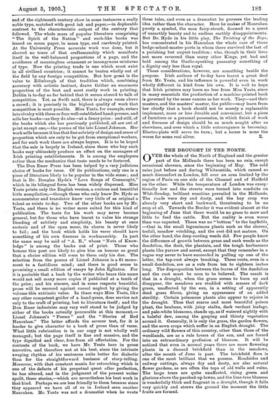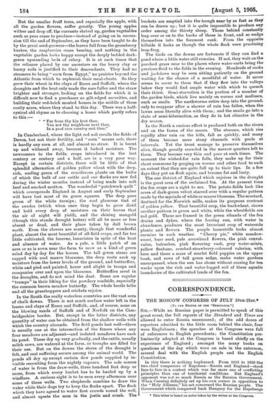O VER the whole of the North of England and the
greater part of the Midlands there has been no rain, except occasional showers, since the beginning of May. The cold rains just before and during Whitsuntide, which caused so much discomfort in London, fell over an area limited by the region of Paris on one side of the Channel and of Hatfield on the other. While the temperature of London was excep- tionally low and the streets were turned into conduits on Whit-Sunday, brilliant sunshine prevailed in the Midlands. The roads were dry and dusty, and the hay crop was already very short and backward, threatening to be no crop at all. Towards the Border it was evident almost at the beginning of June that there would be no grass to mow and little to feed the cattle. But the reality is even worse than was expected. There was no " bottom " to the hayfields, —that is, the small leguminous plants such as the clovers, trefoil, meadow vetchling, and the rest did not mature. On the other hand, the deep-rooting weeds did. Few people know the difference of growth between grass and such weeds as the dandelion, the dock, the plantain, and the tough herbaceous plants like yarrow and sorrel, except that they remember in a vague way never to have succeeded in pulling up one of the latter, the tap-root always breaking. These roots, even in a small dandelion, are as a rule from ten to eighteen inches long. The disproportion between the leaves of the dandelion and the root must be seen to be believed. The result is that in a drought, when the grass seems to burn up and disappear, the meadows are studded with masses of dark green, unaffected by the sun, in a setting of apparently dead grass fibres, giving an appearance of an added sterility. Certain poisonous plants also appear to rejoice in the drought. Thus that scarce and most beautiful poison plant, the henbane, with juicy stalks, dark verdant leafage, and pale-white blossoms, stands up, as if watered nightly with a baleful dew, among the gasping and thirsty vegetation around it. Generally, it is only the grass, the garden flowers, and the sown crops which suffer in an English drought. The ordinary wild flowers of this country, other than those of the woodlands, are as a rule lovers of the sun, and are forced into an extraordinary profusion of blossom. It will be noticed that even in normal years there are more flowering plants in a disused brickfield than in the meadows, after the month of June is past. The brickfield flora is one of the most brilliant that we possess. Roadsides and railway cuttings, always dry and dusty, are also natural flower gardens, as are often the tops of old walls and ruins. The large trees are quite unaffected, rising green and glorious above the parched-up lawns, and the lime-tree blossom is wonderfully thick and fragrant in a drought, though it falls very quickly and strews the ground the moment the little fruits are formed. But the smaller fruit trees, and especially the apple, with all the garden flowers, suffer greatly. The young apples wither and drop off, the currants shrivel up, garden vegetables such as peas cease to produce—instead of going on in succes- sion till the end of September, as they have been taught to do by the great seed-growers—the leaves fall from the gooseberry bushes, the raspberries cease bearing, and nothing in the vegetable garden looks happy except the deeply bedded dark- green upstanding beds of celery. It is at such times that the reliance placed by our ancestors on the heavy clay or loamy soils is justified to their descendants. They had no . steamers to bring "corn from Egypt," no prairies beyond the Atlantic from which to replenish their meal-chests. So they grew their wheat in the clays of Essex and Suffolk, where the droughts and the heat only made the ears fuller and the straw brighter and stronger, looking on the fields for which it is difficult now to find a purchaser as gilt-edged securities, and building their red-brick moated homes in tile middle of these , costly acres, where they stand to this day. There was a half- cynical old rhyme as to choosing a home which partly refers • " Far from thy kin kest thee, Vex not thy neighbour next thee, In a good corn country rest thee."
In Cumberland, where the light red soil recalls the fields of Devon, but not their fertility, and " corn " means oats, there is hardly any corn at all, and almost no straw. It is burnt up and withered away, because it lacked moisture. The newcomers to the fields, crops introduced in the last century or century and a half, are in a very poor way. Except in certain districts, there will be little of that splendid alternation of golden yellow wheat with the deep,
rich, cooling green of the cruciferous plants on the bulbs of which the bulk of our cattle and our flocks are now fed during the winter months instead of being made into salt beef and smoked mutton. The wonderful "patchwork quilt"
which overspreads EUgland in August and early September will have lost most of its green squares. The deep pure green of the white turnips ; the cool glaucous tint of the swedes (which when -once they begin to grow distil and bold every drop of moisture on their leaves that the air of night will yield), and the shining mangold (though this stands drought better) will all be more or less
absent or dead, and their place taken by dull brown earth. Even the clovers are scanty, though that wonderful plant, almost the most beautiful of all field crops, and far too little cultivated, the lucerne, luxuriates in spite of the heat and absence of water. As a yule, a little patch of an acre or so is sown near the farm to mow as a kind of green salad day by day for the horses. The tall green stems are capped with cool mauve blossoms, the deep roots suck up moisture from the lower levels of the ground, and butterflies, white and pied and painted, hover and alight in troops and companies over and upon the blossoms. Butterflies revel in the droughts, and do not mind the dust. Some are regular "tramps" in their liking for the powdery roadside, especially the common brown meadow butterfly. The whole beetle tribe and all the grasshoppers and crickets rejoice.
In the South the really waterless countries are the vast area of chalk downs. There is not much surface water left in the barns and clays of Essex and Suffolk, and, of course, none on the blowing sands of Suffolk and of Norfolk on the Cam- bridgeshire border. But, except in the latter districts, any quantity of water can be obtained from the shallow wells with
which the country abounds. The field ponds last well—there is usually one at the intersection of the fences where any four' meadows are adjacent—and isolated meadows have each its pond. These dry up very gradually, and the cattle, usually milch cows, are watered at the farm, or troughs are filled for their use. But on the downs the stress of the drought is felt, and real suffering occurs among the animal world. The ponds all dry up except certain dew ponds supplied by in-
visible recruiting from the nightly vapours. The sole source of water. is from the draw-wells, three hundred feet deep or more, from which. every bucket has to be hauled up by a "windlass. A curious sight is to be seen every afternoon near
some of these wells. Two shepherds combine to draw the water while their dogs try to keep the flocks apart. The flock ,which they have agreed to water first crowds round the well, and almost upsets the men in the jostle and crush. The order among the thirsty sheep. Those behind constantly leap over or on to the backs of those in front, and so wedge themselves into the foremost rank. From the opposite hillside it looks as though the whole flock were practising leap-frog.
The birds on the downs are fortunate if they can find a pond where a little water still remains. If not, they wait on the parched grass near to the places where water-carts bring the precious fluid to the folds in the evening. Hundreds of rooks and jackdaws may be seen sitting patiently on the ground waiting for the chance of a mouthful of water. It never seems to occur to them that if they flew into the valleys below they would find ample water with which to quench their thirst. Semi-starvation is the portion of a number of the garden birds, which live mainly on worms and molluscs, such as snails. The earthworms retire deep into the ground, only to reappear after a shower of rain has fallen, when the lawns seem literally alive with them; and the snails go into a state of semi-hibernation, as they do in hot climates in the dry season.
In the North a curious effect is produced both on the rivers and on the fauna of the moors. The streams, which rise rapidly after rain on the bills, fall as quickly, and many of them become mere stony channels with pools at intervals. Yet the trout manage to preserve themselves alive, though greatly crowded in the narrow quarters left to them. They become very thin and poor at such times. The moment the wished-for rain falls, they make up for their short commons by gorging on worms and other food to such an extent that they are quite full up to their lips. In a few days they put on flesh again, and become fat and lusty.
The one district of England which rejoices in the drought is the great area of the reclaimed fen. At the present time the fen crops are a sight to see. The potato fields look like acres of dark-green velvet starred over with a regular pattern made by the myriads of white or mauve blossoms. The mustard, destined for the Norwich mills, makes its gorgeous contrast
of golden yellow. That beautiful crop, the buckwheat, shows another pattern in green and white, while the wheatfields are
red gold. These are framed in the green ribands of the fen drains and dykes, where the forcing sun, with water in abundance, produces the most luxuriant crop of waterside plants and flowers. The purple loosestrife looks almost carmine in such weather. "Cherry pie," white meadow- sweet, burr reed, pale arrowhead flowers, the pink convol- vulus, bulrushes, pink flowering rush, grey water-mints, yellow fleabane, crushed-strawberry-coloured valerian, with here and there a mass of scarlet field poppies on the upper bank, and rows of tall green sedge, make water gardens unsurpassed, when the sun has shone without ceasing for ten weeks upon the rich and water-logged soil of these aquatic boundaries of the cultivated lands of the fen.







































 Previous page
Previous page